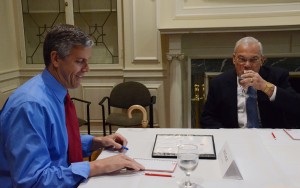
The U.S. Department of Education published a federal rule Monday, implementing changes to the Jeanne Clery Act to promote safety and security on college campuses regarding sexual assault, dating violence, domestic violence and stalking.
The regulations will officially take effect July 2015. They require higher education institutions to publicize services and protections regarding sexual assault that are available to students and employees, said U.S. Secretary of Education Arne Duncan.
“The Department has the responsibility to ensure that all of our students have the opportunity to learn and grow in a safe environment,” Duncan said in a Friday press release.
Colleges and universities will be expected to collect and disclose statistical crime information reported to campus and local police departments involving sexual violence. The information then must be released in their annual security reports, a condition of participating in the federal student financial aid programs authorized by Title IX, according to the report.
Boston University Police Department Captain Robert Molloy said when sexual violence is reported, BUPD collects as much information as possible, files a police incident report and investigates the scene.
“The new laws won’t change the way we respond to domestic violence, but it will make sure reports are received,” he said.
The rule expands the categories of incidents that colleges and universities compile and report annually and adds new categories of hate crime bias: gender identity and national origin, said BU spokesman Colin Riley.
“The benefit of this information is that community members and prospective students and their parents will be able to access it and make informed decisions about campus safety,” he said.
Jessica Klein, health resources coordinator for the Center for Gender, Sexuality and Activism, said she commends the inclusion of stalking as a crime that is often unjustly disregarded as a form of sexual and gender-based violence.
“These new laws, and the conversation around them, will help to bring these issues to light on BU’s campus and hopefully change the culture,” Klein, a junior in the College of Arts and Sciences, said.
Klein said because sexual assault is underreported, it is difficult to determine how accurate the new numbers BU is required to report will be.
Sexual Assault Response and Prevention Director Maureen Mahoney said the rules closely align with programs BU already has in place, such as the prevention and awareness programming. SARP promotes the bystander intervention education program Step Up Step In BU, Sexual Assault Awareness Week and other programs during incoming University Orientation sessions.
College of Arts and Sciences senior Erinn Benedict said by providing hard evidence of sexual violence and requiring the specific recordings of judiciary hearings, the government can ensure perpetrators are receiving appropriate punishments.
“Clearly, many institutions have come under heat in the past year or so for failing to take an active role in curbing sexual violence on campuses,” she said. “I’m glad to see that the government is stepping in to ensure that colleges are required to deal with sexual violence head on.”
Annie Duer, a senior in the School of Management, said the law includes important provisions like its revision of the categories of bias, adding gender identity and the separation of ethnicity and nation of origin into different categories of hate crimes.
“It is incredibly important that students feel safe on campus because the right kind of environment is what will fuel learning and growth,” she said. “While the law does take important steps, it alone cannot make a difference. Beyond enforcing the law, there needs to be a change in behavior.”






















































































































